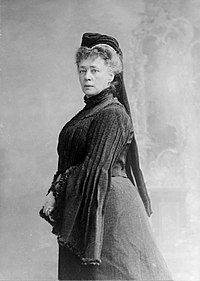(source)
ANOTHER FORGOTTEN BUT IMPORTANT WOMAN OF HISTORY:
BERTHA VON SUTTNER
By Kevin Anthony Stoda, Wiesbaden, Germany
Most people on the planet Earth these days have no idea who likely had the most influence in leading Alfred Nobel to create what has come to be known as the Noble Peace Prize. This was likely the result of the activities and leadership of one Germanic woman, who was born in Prague during the Habsburg final Empire, i.e. in what later became Czechoslovakia and is now the Czech Republic. That woman was the Bohemian Bertha von Suttner.
Suttner came from royal family, but as she had never really received any inheritance from her impoverished household, she normally made due in life financially as a journalist and as romance novelist in Victorian Europe. Bertha von Suttner died a week before the shooting in Sarajevo in 1914, which set in motion the march to WWI.
http://www.dhm.de/lemo/html/biografien/SuttnerBertha/
Suttner would have been horrified by the events of the First World War as she had spent the past 4 decades trying to persuade European leaders that war was totally against the laws of good human development--and unnecessary in the greater scheme of global competition. She was after all a Darwinist, and for her, wars were the lowest level of intelligent design and human development, i.e. settling disputes could not be a solution for modern humans.
This Darwinist and humanitarian belief was at the core of her pacifist world philosophy--as it was among many other statesmen of her day around the globe. Before she passed away, Suttner he was recognized as the first female recipient of the Nobel Peace Prize for her life's efforts to build a European Peace over the preceding decades.
http://nobelprize.org/nobel_prizes/peace/laureates/1905/suttner-bio.html
Modern historians often forget that discussion and debate over militarism, colonialism, and pacifism dominated in the public realm of the German and Austrian Empires in the late 1880s and 1890s as modernists, humanitarians, and socialists all argued against these evils [i.e. colonialism, militarism and war]. This was also true in France, which had last lost a major war with Germany in 1870-1871. Suttner, herself, became involved in the international peace movement initially through the French Arbitration and Peace Initiative, formed in Paris around 1880.
http://www.answers.com/topic/peace-movement
Born in 1843, Suttner, herself, had only peripherally experiences in war. Occasionally, she stated in interviews that she never really knew how her pacifism developed inside her being. Sutter seemed to imply that she awoke up one moment and Pacifism [with its call to world Peace] was in her heart and mind from that day onwards. However, her earlier books talked of humanist ideals and the respect for one's fellow men and women.
After she became a household European name around 1890-1891, Suttner formed the Austria Society of Peace & Fellowship. Born as Grà �fin Kinsky, Mrs. Suttner was seen in Austria and Germany as a radical pacifist, but was actually originally born in a military family. Suttner "was born the daughter of an impoverished Austrian Field Marshal, Franz-Josef Graf Kinsky von Wchinitz und Tettau." She had been active in expounding peace for a decade, when her 1889 pacifist novel put her at the top of European reading lists for a decade.
http://de.wikipedia.org/wiki/Bertha_von_Suttner
LAY DOWN YOUR ARMS
It was in 1889 that Suttner published a book that quickly made her the rave of the age throughout most of colonial Europe as a new century dawned. In the work, she had struck the Zeitgeist of concern for the continent of Europe. Alone in the German language, her book, LAY DOWN YOUR ARMS [DIE WAFFEN NIEDER], was republished 37 times within a decade. In 1891 she chaired and spoke at the Peace Conference in Rome and founded the German Peace Society the next year. There in Prussian Germany the membership of this organization jumped to 2000 in a period of weeks. Suttner joined in organizing the International Peace Conferences in Bern, Antwerp, and Hamburg throughout the 1890s, but she also promoted very specific solutions to permanently promote peace world-wide. For example, she gave Kaisar Franz Joseph of Austria-Hungary a list of signatures of peoples, like her, who were supporting the creation of the first international peace court, which was again promoted in Den Haag Peace Conference two years later. [In 1945, Den Haag would actually become the Court of International Justice under the new United Nations.]
(Note: You can view every article as one long page if you sign up as an Advocate Member, or higher).





